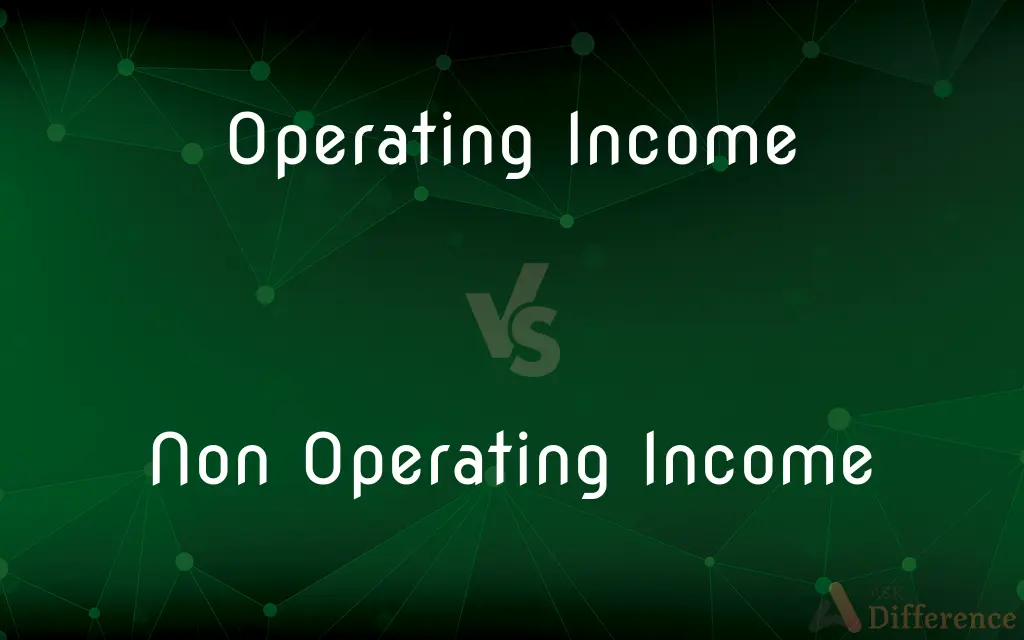Operating Income vs. Non Operating Income — What's the Difference?
By Tayyaba Rehman — Published on October 15, 2023
Operating income is revenue from core business operations, subtracting operating expenses; non-operating income is revenue derived from secondary, non-core activities.

Difference Between Operating Income and Non Operating Income
Table of Contents
ADVERTISEMENT
Key Differences
Operating income and non-operating income are critical financial metrics, each defining a different aspect of a business's financial health. Operating income primarily pertains to the profit a company earns from its core business activities. It is calculated by subtracting the cost of goods sold (COGS) and operating expenses from the company’s total revenue. It reflects the profitability derived from a company's regular, core business operations and serves as an indicator of the business's operational efficiency. In contrast, non-operating income relates to the revenue generated from secondary, non-core activities of the business. These can include gains from investments, profits from asset sales, or income from interest.
The distinction between operating and non-operating income is vital for assessing a company's financial performance accurately. Operating income is indicative of how well a company is managing its core business activities and operating expenses, which directly impacts the company’s profitability and sustainability in the long run. Non-operating income, however, is not a reliable metric for judging the company’s operational efficiency as it arises from non-recurring, incidental activities that are not integral to the main business operations. Relying on non-operating income is usually not sustainable as it is often irregular and unpredictable.
Understanding operating income is crucial as it offers insights into the company's operational profitability, shedding light on how effectively a company is utilizing its resources to generate profits from its core business activities. It provides a clear picture of a company’s earning capability from ongoing operations, excluding any profits or losses from non-core activities, allowing stakeholders to make informed decisions. Non-operating income, being unrelated to the main business activities, is not considered when evaluating a company's operational performance. It is usually isolated from operating income to ensure that stakeholders get a true picture of the company’s operational profitability.
In financial analysis, discerning between operating and non-operating income enables precise evaluation of a company’s profitability and financial health. It helps in assessing whether the profits are generated from the primary business activities or other incidental sources, which is essential for investors, creditors, and other stakeholders in making financial decisions. Operating income is a more consistent and reliable measure of a company’s performance and its potential for growth and profitability. In contrast, non-operating income can be sporadic and should be considered with caution as it does not reflect the profits from the main business operations.
Comparison Chart
Definition
Profit from core business activities.
Income from secondary, non-core activities.
ADVERTISEMENT
Reliability
Consistent and recurring.
Often sporadic and non-recurring.
Impact on Business
Directly related to main business operations.
Not a direct outcome of core business activities.
Evaluation
Indicator of operational efficiency and success.
Not a true reflection of operational performance.
Consideration
Crucial for financial analysis.
Considered separately in financial analysis.
Compare with Definitions
Operating Income
It is derived by subtracting the cost of goods sold and operating expenses from total revenue.
A consistent growth in operating income is indicative of a company’s sustained profitability from its regular business activities.
Non Operating Income
It encompasses income from secondary, incidental sources such as investments or asset sales.
Non-operating income, being irregular, is not a reliable measure for assessing a company’s operational efficiency.
Operating Income
Operating income is the profit earned from a firm's normal core business operations.
The increased operating income demonstrates the company's enhanced efficiency in managing its core business operations.
Non Operating Income
Non-operating income is often non-recurring and can significantly vary from one period to another.
The fluctuating non-operating income, due to its non-recurring nature, should be analyzed with caution.
Operating Income
It is a key indicator of a company’s performance, excluding any non-operating activities.
Investors often consider operating income as it reflects the true earning capability from ongoing operations, isolating any non-operational profits or losses.
Non Operating Income
Non-operating income refers to the revenue generated from activities not related to a company's core business operations.
The sudden spike in profits was due to non-operating income from the sale of a company asset.
Operating Income
Operating income provides insights into the operational efficiency and financial health of a company.
Stakeholders rely on operating income to understand the profitability stemming from the company's core business.
Non Operating Income
Non-operating income is isolated from operating income in financial statements to avoid distortion in financial analysis.
Non-operating income was high this quarter due to substantial gains from investments, masking the true operational performance of the company.
Operating Income
It represents the amount of revenue remaining after covering operating costs and overhead.
Analyzing operating income is vital for assessing a company’s ability to generate profit from its primary operations.
Non Operating Income
It is not a reflection of the company’s main business activities and is considered separately in financial analysis.
A reliance on non-operating income can be risky as it does not arise from the company’s primary business operations.
Common Curiosities
What is operating income?
Operating income is the profit earned from a firm's normal core business operations.
Does operating income reflect the company’s financial health?
Yes, operating income is a crucial metric in assessing a company’s financial health and operational profitability.
How is operating income calculated?
It is calculated by subtracting the cost of goods sold and operating expenses from total revenue.
Why is operating income important?
It is important as it provides insights into the operational efficiency and profitability of a company.
Can non-operating income be negative?
Yes, non-operating income can be negative due to losses from investments or sale of assets.
What is non-operating income?
Non-operating income is the revenue generated from activities not related to a company's core business operations.
Is operating income more reliable than non-operating income?
Yes, operating income is more reliable as it is consistent and reflects profits from core business operations.
Can non-operating income distort financial analysis?
Yes, it can distort financial analysis as it arises from non-recurring, incidental activities unrelated to core business operations.
Is non-operating income a true reflection of a company’s performance?
No, it is not a true reflection of company’s performance as it does not represent profits from main business operations.
Can a company sustain itself on non-operating income?
Relying solely on non-operating income is risky as it is often irregular and non-recurring.
Does operating income include income from investments?
No, income from investments is considered non-operating income.
Should non-operating income be considered in financial analysis?
It should be considered but analyzed separately to avoid distortions in assessing a company’s operational performance.
Is operating income an indicator of business success?
Yes, it is a key indicator of operational efficiency and business success.
Is non-operating income included in the income statement?
Yes, it is included but is listed separately from operating income.
Which is more important for investors, operating or non-operating income?
Operating income is generally more important for investors as it reflects the company’s earning capability from its core business.
Share Your Discovery

Previous Comparison
Plant Cell vs. Animal Cell
Next Comparison
Political Parties vs. Interest GroupAuthor Spotlight
Written by
Tayyaba RehmanTayyaba Rehman is a distinguished writer, currently serving as a primary contributor to askdifference.com. As a researcher in semantics and etymology, Tayyaba's passion for the complexity of languages and their distinctions has found a perfect home on the platform. Tayyaba delves into the intricacies of language, distinguishing between commonly confused words and phrases, thereby providing clarity for readers worldwide.













































